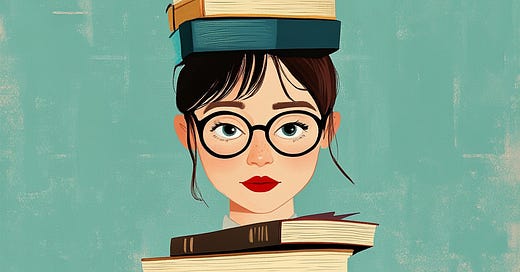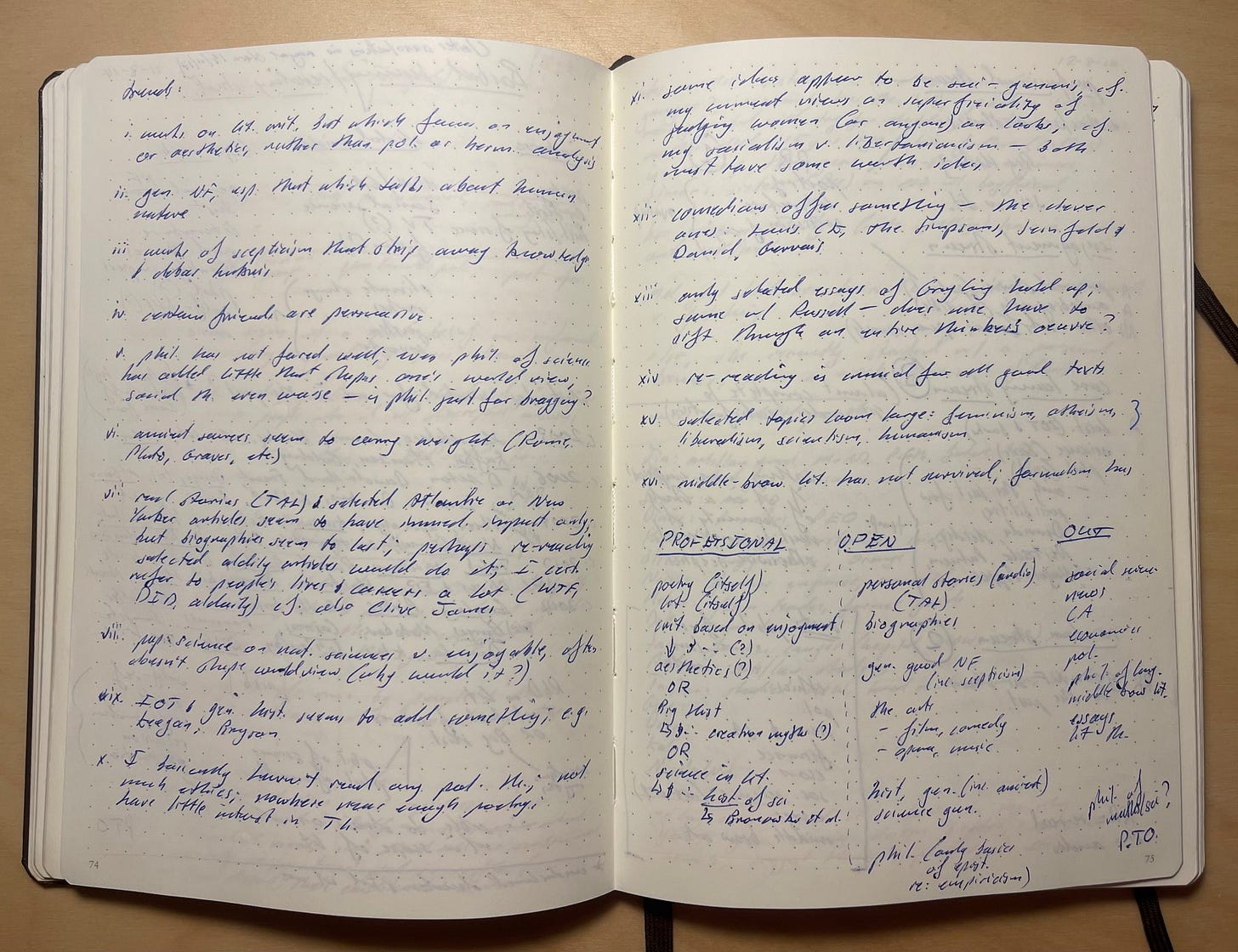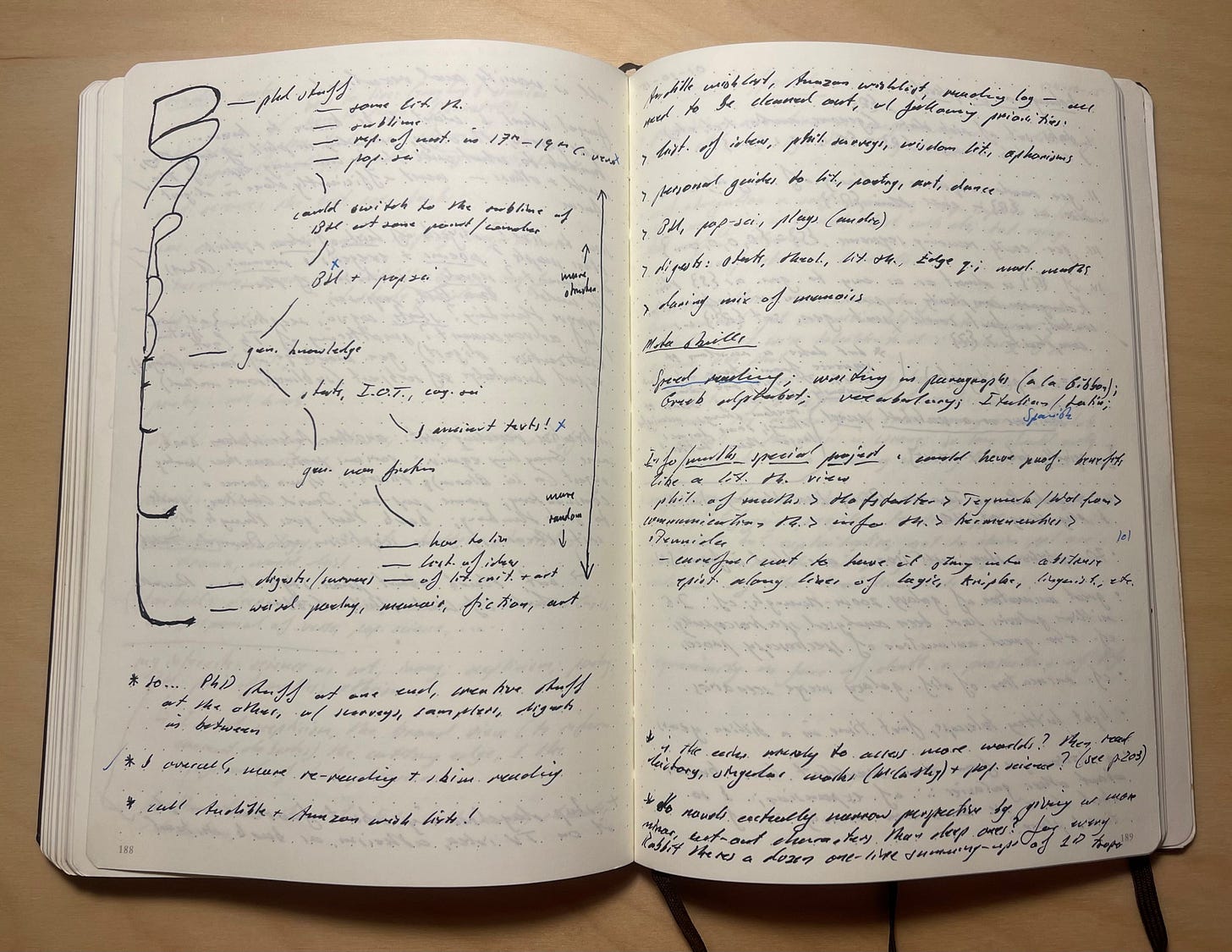I often reflect on my life up to now and conclude that I’ve only learned two or three useful things. The first and most robust lesson is: never order the banquet at a restaurant. It’s always a bad deal. I want this inscribed on any tombstone or plaque marking my death. Another good tip is for black coffee drinkers: try adding a tiny pinch of salt. It works to remove some of the bitterness, especially for espresso coffee.
And that’s about it — the sum of my wisdom, gleaned from four decades roaming this planet, including studying for the highest academic award.
The only other insight I can share is some useful advice on reading. Even then, most of what I know about reading is covered in this wonderful post by another serious reader, Ted Gioia.1 He details his lifelong reading plan, including
the importance of slow reading,
reading aloud,
keeping a log, and
separating it from professional reading.
Here I offer a one tip beyond what’s covered in Gioia’s post.
How to do a reading audit
Every six to twelve months, I do a quick audit of my recent reading.
Step 1
First, I simply list all the things I’ve recently read that have reverberated within me. If I find myself still thinking about some work, I jot it down. Most of what I’ve read is not immediately recalled to mind.
Step 2
Then I make another list of more deliberate recollections, to get an idea of what else I read but which didn’t seem to have much impact. For this, I go through my Audible library to see what I’ve listened to recently, I consult the log I keep of novels I read, I look at my bookshelves at home and work, I look at my borrowing history from my library, and I try to remember any serious online reading I’d done, and so on.
This doesn’t take very long and it doesn’t have to be thorough or scientific. The point is to get a sketch of what I read in the last while that was forgettable and what was memorable. For example, say I notice I’ve been reading a lot of history books but they go in one ear and out the other, I might decide to deprioritise them from now on.
This is the cardinal point: the audit can reveal whole tracts of reading that might as well have not happened. Lots of writing leads to amnesia: temporarily engrossed, you happily read on but none of it sticks. We’ve all read books like this. Maybe most books are like this for most people. But in a short lifetime, who can afford to plug themselves into a mind-pausing novel, or unthinkingly plough through some think pieces?
At the same time, we don’t want to slavishly prioritise what was most memorable. Something might be memorably bad or traumatic. And some work, especially poetry or perhaps comedy, is about enriching the time spent consuming it, rather than retaining the content. You’re a sensible person and I’m sure you’ll take these and other caveats into account. Mostly, the audit is there to reveal wasted reading so you can shed it in favour of the reading you’ll get more out of — or to use your finite endowment of time elsewhere.
For this reason, the first couple of audits I did were by far the most useful. There have been diminishing returns ever since, as I’ve refined my reading. So I strongly recommend doing this at least once even if you don’t make it a habit.
Also note that I sometimes include listening and viewing too. Podcasts and TV shows are ripe for audits.
Step 3
I finish the audit with a quick plan for the next period’s reading — read more X, read less Y, that type of thing. This is a very basic methodology, but it has had an extraordinary impact on my life.
This isn’t about trying to optimise reading or becoming a more productive reader or reading Ten Books To Make You A More Insufferable Podcast Host. It’s mainly a via negativa process: taking away what isn’t working or is harmful.
Some results from my audits
I dug out an old notebook and it looks like my first audit was a decade ago, on August 11 2014. Scroll to the bottom if you want to see how serial-killer-ish my notebooks are.
For the curious, here are some findings from my audits.
Most of the reverberate reading I did was either “general nonfiction” or great novels.
The best nonfiction is that which contains more than one idea; most nonfiction is simply one idea and should have stayed as a feature article.
I retained very few articles, even though that was for years one of my main and favourite types of reading. (I mean articles from monthly magazines, reviews, stuff on Arts & Letters Daily, etc.)
I found no difference in terms of impact or retention between physical books and audiobooks, except that, especially by listening at increased speed while doing mundane tasks, I could experience audiobooks more quickly.
I tried many notetaking schemes for audio and settled on having a separate note in my phone for each book.
Rereadings of favourite books were always worthwhile.
Recommendations from friends/family are obviously hit and miss, but are worthwhile because of the shared experience.
Contemporary poetry wasn’t quite worth it. I subscribed to Poetry magazine for years. But it’s too recent to be filtered. Lazily, I resort to pre-21st century poetry. (I do still buy some current poets’ work, like Ali Cobbie Eckermann, Tracey K Smith, and Anne Carson — I’m not a monster.)
Almost everything in the social sciences (including areas like behavioural economics, evolutionary psychology, sociology, political science) ages like milk.
Unlike current social media sludge, Twitter used to actually be a valuable read for me. I had a highly curated feed with all political content muted. I followed absurdist comedians, poets, artists, friends, and select scientists and could dip into it for a moment of creativity. Those people have left the platform and the feed sucks now.
Note that I had already been news-free for about four years when I did my first audit. That was probably the most important change to my reading habits or my broader information diet. (I’ve told dozens of people over the years, as far as I know no one has taken it up, though many have expressed interest). News is negative information. It reduces one’s knowledge of the world. By news I mean 24 hour news cycle crap. Longform journalism on some important topic is worth reading. But it should be sought out when needed. Imbibing daily news is as dangerous as cigarettes.
By the second audit (October 2015) I’d adopted a barbell strategy: I tried to cut out “the middle” while doubling down on 80% blue chip reading (classics, history, reading for my PhD at the time) and a 20% high risk/high return set of readings (weird poetry, experimental fiction, memoirs, digests of topics I wouldn’t normally read about, etc.). What counts as the timewasting middle will depend on you. For me it was a few genres that I wasn’t getting much from: memoir, philosophy, “fun” novels (I’ll let people interpret that however they want), self-help.
I still have a barbell and it looks like this
80% blue chip stock. Great fiction, professional reading (some books but mainly papers, mainly about AI, for my research day-job).
20% high risk investments. General nonfiction (mainly as audiobooks), people’s recommendations, various Substacks.
I’m no longer on Twitter. I’m trying to cut-out YouTube. I listen to fewer podcasts, more audiobooks. I fantasise about doing a year without electronic media of any kind, of starting January 1 with a large stack of great books and having no other source of “content”. It might heal my attention span or provide a slow panorama in a world of staccato close-ups. Or it might just be nice.
The long view
After 10 years of audits, I see my reading has been extremely wide, if not deep. I’ve ranged over continents of knowledge. It has been a great privilege, aided by being born an English speaker, living in the age of free information, with the luxury to study, and having made the choice to pursue learning.
I’m not as interested in as many things as I used to be. I’m more deeply interested in a few. If I quit my day job — in fact my day job is soon to quit me — I would focus my reading down to
the perennially rich sources (great literature, especially poetry; high quality history);
a few problem areas I want to contribute to (nuclear weapons, the rise of surveillance capitalism); and
the great intellectual adventure of our time: understanding human cognition.
And yet, despite planning and auditing, improbable writings continue to shape me. Just recently, I read a mind-blowing Twitter thread on World War Ant. I read a beautiful essay about real art by the poet Greg Gerke. A dying uncle pressed into my hand a book by Garrison Keillor; I was sceptical for several reasons, but I just started reading it and the writing is very fine. Today, I bought a secondhand book I noticed in a bargain bin, for $2.50 AUD, and started reading extraordinary tales of insane figures from the British empire in the nineteenth century. Great. And like all stout citizens I still get lost in Wikipedia rabbit holes.
Having read just widely enough to fairly scope my own ignorance, I recognise the burden of the world’s mystery. Whole universes, old and new, are continually unlocked by words.
See also this nice post on reading well by Simon Sarris.







Holy crap. Just did the salt in coffee thing.
Interesting comment on not paying attention to the daily news. I had a debate coach in college who told me he never read a newspaper or listened to the news. Yet he always seemed up on current events. When I asked him how that worked he replied if anything really important happened someone always told him about it. Usually as it was occurring.